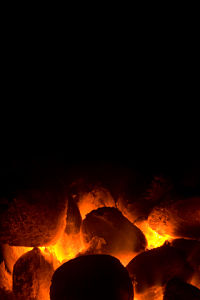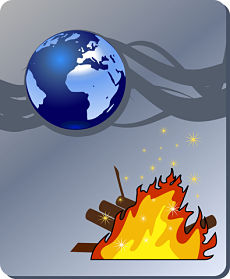Killer Reasons to Break Up with Your Grill This Summer
The start of warm summer breezes and promise of the Fourth of July inspire many to drag out their barbecue grill. Charcoal and lighter

Barbeques deliver a double dose of dangerous chemicals. These hazards get into your body through your lungs and your digestive tract.
fluid join the bestseller list. Outdoor cooking sets the stage for traditional get-togethers with family and friends.
This romance with barbecues has a dark side that few know about. After all, information about polycyclic aromatic hydrocarbons (PAH) is obscured by millions of dollars of ads and happy images for grilled meat.
As is the case for most toxic chemicals, the long-term health effects of PAH are poorly understood, so easy to ignore. Yet PAH is an insidious public health nightmare that can invade your own life and the next generation.
Truth in labeling would require an explicit warning on bags of charcoal and packs of meat and fish. “Eating grilled or smoked animal foods can cause DNA mutation, cancer, and lower intelligence in your children.” Wide knowledge of these dangers might inspire many to consider alternatives, or at least make informed decisions.
Polycyclic aromatic hydrocarbons are a product of incomplete combustion of materials that contain carbon. Burn tobacco, wood, oil, gasoline, coal, garbage – or meat and fish – and PAHs will form. Over 100 varieties of PAHs can menace our health and the environment.
A widespread nutrition myth touts that the major harm from eating meat results from ingesting animal fat. So barbecuing and grilling have become popular cooking methods. Fat from the meat drips away from the part people will consume, resulting in “leaner” food.
The unintended consequence of this method is that the fat burns once it hits the source of heat. Smoke from the fat plus products of combustion of the heating method (charcoal, wood, propane, etc.) envelope the meat. This smoke is dense with PAHs, which are likely more dangerous than the fat was. In fact, animal protein is at least as hazardous as animal fat in its effect on cholesterol specifically and on health in general. So concern about the fat was not the highest priority to begin with.
Barbecuing produces a double dose of PAHs that get into your body through two avenues. First, breathing the smoke from the burning coals and cooking meat delivers PAHs directly into your bloodstream from your lungs. Secondly, eating the grilled or smoked meat or fish subjects your intestinal walls to PAH. These walls can be directly damaged, and the chemicals are also absorbed with the food into your body. Fish and shellfish accumulate PAHs in contaminated water, and so may be an even more potent source of these chemicals than meat is.
So what are the damages from breathing and eating polycyclic aromatic hydrocarbons?
• Cancer – PAH is recognized by the federal government as a carcinogen. Given the lax industry oversight that government is famous for, a chemical has to really work to be officially named a carcinogen.
• PAHs can damage your lungs, eyes, liver, skin, red blood cells, immune system, and kidneys
Even more disturbing is the effect of PAHs on unborn children.
• PAHs can damage DNA, leading potentially to birth defects
• Exposure to PAHs in utero increases the risk that the child will develop leukemia or other cancers
• Children exposed to high amounts of PAH while in the womb have been shown to lose, on average, about four points off their IQ when they are five years old. This is enough of a decrement to hurt school performance. The chemicals may also impair other aspects of the child’s development.
Grilled and barbecued meats subject you to heterocyclic amines (HCAs) as well. HCAs are another class of hazardous chemicals that form when meat (especially chicken) is cooked at high temperatures. Like PAHs, HCAs increase your risks of cancer and damaged DNA.
Another hazard is in the charcoal itself, if that is how you barbeque. High quality charcoal is made from wood. Forests are cut down and wildlife is wiped out so people can grill carcinogenic steaks.
Cheaper commercial charcoal is actually made of wood scraps glued together and infused with additional chemicals. No one knows the health effects of the burning charcoal additives, especially as these may mix with PAHs and HCAs.
Even if you really love barbecued, grilled, or smoked meat and fish, think about whether you are willing to pay such a hefty price to eat them. Is the cost/benefit ratio favorable to you and your children?
So many delicious alternatives beckon. In contrast to grilled meat and fish, whole plant foods are healthy and sustainable. You could even experiment with solar cooking if you want to prepare food outdoors. Cooking with the sun – the next generation of fun and challenge!
Intrigued? Now you can use our Whole Foods Blog Finder to target informative, fun postings on plant-based nutrition. Quick information at no cost!
Blog posting by Janice Stanger, Ph.D. Janice authored The Perfect Formula Diet, a nutrition book built on sustainable food choices. Enjoy six kinds of whole foods for permanent, hunger-free weight loss and health.
Tags: barbecue, charcoal, environmental degradation, family, getting healthy, HCA, heterocyclic amines, in utero, Janice Stanger, making a difference now, nutrition facts, PAH, Plant-based nutrition, polycyclic aromatic hydrocarbons, whole foods





